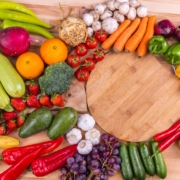Human Nature
By Bill Adler, MPH, RS
Technical Food Safety Consultant
It never ceases to amaze me the lengths we go to, to make “things” cosmetically correct. At times, my wife has 17 different lotions, eye enhancers, hair lighteners, anti-wrinkle creams, cuticle sticks, nail files, cream rinses, shampoos for various conditions, conditioners of all sorts, and so on, in the bathroom. I have a bar of soap in the shower and soft soap at the sink. Oh yeah, both of us have our own flavors of toothpaste. Telling her it’s hard to enhance perfection gets me nowhere. The bottles and tubes and jars still cover the counter and shower shelves because the industry demands she continue to enhance herself.
We do the same with toilet seats and sinks. The list of cleaners we have takes up a shelf in the closet. And then the brushed nickel appliances in the kitchen need their own cleaners and polishes. All in the name of appearance rather than actually doing something to make them better.
But what do we do with food? Most often, not much. Oh, we cover it with cream sauces and flavor enhancers, like lemon pepper, gravy, or glazes. Or we add salt, catsup, salad dressings, or barbecue sauce to ‘bring out the flavor’. But we don’t, by and large, do much to clean it before eating it. This holds true for meats and fish, as much as it does for fruits and vegetables. Unless it’s a clean surface, to begin with, almost everything we eat has some gunk on it that either detracts from the flavor or makes it harmful.
Let’s look at chicken. Studies have shown that 30% or more of it has Salmonella or Campylobacter on the outside when it comes to our kitchens. Rinsing it under the tap literally removes some of it, but a good blast of water also spreads it around the countertop, waiting to get onto ready-to-eat foods like fruits, vegetables, deli meats, and just about everything that touches the counter surrounding the sink. Unless the counters are thoroughly cleaned with soap and something designed to actually kill the bacteria, like bleach. Pushing it around with a wet cloth doesn’t do much to remove it. The science of counter-top cleaning says washing/wiping with a water-soaked cloth leaves a bio-film on the surface. And this biofilm contains all sorts of things that can lead to some nasty illnesses. Should you wash chicken in the sink? Maybe or maybe not, because we’re going to cook the chicken and get rid of most of the Salmonella, etc, in the cooking process.
But fruits and vegetables are often eaten raw in this country. Historically, we haven’t done much to clean them before eating. Rinsing an apple under the tap doesn’t take off much beyond surface dirt. The wax is still there. The natural protective coatings are still there. Bacteria from insects and bird droppings will still be there. The dust and dirt coming down in the rain will be removed, but that’s about it. This is NOT a matter of enhancing appearance. Seriously, we are what we eat. And if we eat processor-applied wax, and grower-applied pesticides beneath the wax, and nature-applied bacteria, there is a strong likelihood there will be effects somewhere down the road.
We sell a lot of fruit and veggie wash to medically employed people. They understand the ramifications of eating parabens (coating waxes) aka endocrine disrupters. They understand the chemistry of how cleaners work to remove surface contaminants and waxy substances. They appreciate the log-termed effects on kids and grandkids, of hormonal imbalance caused by eating low concentrations of endocrine-disrupting waxes. Given that most consumers aren’t chemists or disease experts, the easiest approach is to consider our food is dirty and it is up to us to get it clean. So, should chicken and whole cuts of meat be cleaned before cooking? It probably wouldn’t hurt to at least rinse it off. But cooking solves a very high percentage of the associated problems. Should fruits and veggies be washed? Absolutely, considering so much of it is eaten raw.
This is not a cosmetic thing at all. We’re putting this stuff into our bodies. Our intestines extract the nutrients and unfortunately, the dirt and chemicals carried on the surfaces of that food. This is of particular importance to younger people because their bodies and organs are developing. Pregnant women are of a particular risk because of what this does to their unborn children. Parents/guardians really need to consider what their kids are eating because of the way their systems extract building block chemicals and bacteria through their intestines. Their bodies are still growing and their hormonal (endocrine system) balance is still at risk.
You don’t have to be a scientist to understand how to get better tasting food. A teaspoon of Fruit and Veggie wash, in a gallon of water. Soak for a couple of minutes and do a quick rinse. This is going to remove the wax, pesticides, dirt and a fair amount of the “living things” on the surface, making your fruits and vegetables taste better and literally be better for you.
Bill Adler is an expert in food safety, foodborne illnesses, and the foodservice inspection industry. He has conducted training for the Center for Disease Control and Prevention (CDC) teaching local, state, and federal disease investigators as well as working with laboratory specialists and epidemiologists. Bill has worked extensively with the Minnesota Department of Health (MDH) to perform food service inspections and train local and state public health employees.

